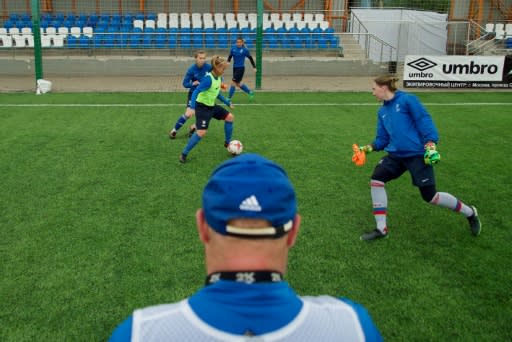Once taboo, Russian women's football eyes World Cup boost
The sniggering kids kept pointing and staring at Margarita Chernomyrdina when she was small because she played football with the boys. She was the first girl brave enough to try and make the junior league. Now rapt crowds watch the 22-year-old lead the women's national team in its quest to win acceptance and respect in Vladimir Putin's socially conservative Russia. The technically-gifted midfielder with the firm gaze and soft smile knows the men's World Cup kicking off in Moscow in a month could work miracles for the Russian women's game. "I think I gave women's football a certain push," Chernomyrdina says after a spirited practice with her domestic side Chertanovo. "Girls saw that they could play football, that it was allowed, that nothing was banned, and that parents should not be afraid," she says. "Of course I think the World Cup will only help." - Soviet ban - Chernomyrdina has spent her life breaking taboos set in the Soviet era and cemented by modern Russia's rigid -- some would say regressive -- view of women's role in the world. The Communist Party brushed aside its stated equality goal and banned women's football outright in 1972 because it was a "men's sport". A brief revival in former Soviet president Mikhail Gorbachev's liberal perestroika era stalled under the weight of catastrophic economic woes. And Putin's Russia has had a hard time embracing the progress made by women in other parts of the world some generations ago. Many aspiring girl footballers still have to brace themselves against cultural stereotypes if they want to play their chosen sport. That is why 17-year-old Olga Belousova giggles shyly and looks away when discussing how others react to her devotion to the beautiful game. "Some of my friends say it's completely normal and others say no, this is not feminine," the national junior team regular says. "I tell people that I like it, that I don't care what the others say. The most important thing is that I like it and this is mine." Sports historians have spun various theories about why women failed to make an impact on Russian pitches while the sport blossomed in places such as Germany and the United States. One popular legend says that great goalkeepers such as Lev Yashin and Rinat Dasayev were associated in Soviet folklore with defenders of the former superpower's sovereignty. This confluence of masculinity and patriotism made football into a tool of political propaganda and left no room for women in the game. Former national team coach Sergei Lavrentyev has little time for such talk as he leads Chertanovo's afternoon training session "In some respects, I think it is more interesting than men's football," he says after shouting out encouragement and instructions in a gruff but amiable style. "It is more emotional, more charged up. The girls, they wear their hearts on their sleeves. I think the girls are even tougher." - 'Everybody just plays' - The Russian team are making some strides. They have reached three consecutive European Championships and beat highly fancied Italy for the first time last year. Chernomyrdina hopes to avenge a 6-0 beating by England in a 2019 World Cup qualifier last year when the teams meet in Russia's next match on June 8. But the professional Russian league has shrunk from 15 teams in 1992 to just eight. Average club match attendance is 200. Chertanovo are full of national team talent but still play in a stadium with one stand that might seat 100 or so. Coach Lavrentyev says the main obstacle to growth is simple: society's apprehension about letting girls kick a ball means they have almost no academies in which to train. "That is why a huge event like the World Cup will help. Millions will see it and there will be a large flow of children to football schools," says Lavrentyev. "It is a real a gift, the World Cup." Viktoria Dubova is not so sure. The 18-year-old international seems to have had enough with the catcalls and sideway glances -- her main goal now is to get good enough to play abroad. "There, they don't see a difference between men's and women's football," she says. "There, everybody just plays." Female footballers at the Chertanovo club are still seeking acceptance in Russia's male-dominated sports world Olga Belousova takes part in a training session at the Chertanovo club in Moscow



